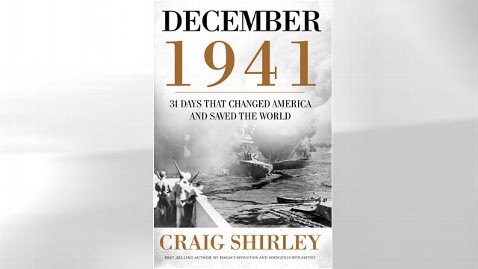Pearl Harbor Day: New Book Reveals Warning Memo

Courtesy of Thomas Nelson
A new book coinciding with the 70th anniversary of the Japanese attack on Pearl Harbor features a 26-page memo detailing the "Japanese espionage effort," received by President Franklin Roosevelt before the Dec. 7 attack.
"It was first declassified in 1985 but as far as we can tell nobody looked at it after that time," said Craig Shirley, author of "December 1941: 31 Days that Changed America and Saved the World."
Shirley said his son discovered the document, prepared by the Counter Subversion Section, Office of Naval Intelligence, while researching at the Franklin D. Roosevelt Presidential Library.
"What struck me about the memo was the detail," he said.
On page two, the memo reads, "Japan is vigorously utilizing every available agency to secure military, naval and commercial information, paying particular attention to the West Coast, the Panama Canal and the Territory of Hawaii."
Roosevelt and his military leaders have been criticized for being inadequately prepared for Japanese attack on Pearl Harbor. There were several warning signs of a pending attack, and "there's no doubt there were straws in the wind," Shirley said.
At the time, Japan had already resigned from the League of Nations, signed a pact with Germany and Italy, and invaded eastern China, Shirley explained, so relations between the U.S. and Japan had soured.
The memo references a "possible crisis," concluding that "a mass exodus of Japanese residents is under way. On December 1, 1941, the Consulate General on the West Coast began to destroy its records, as did the Japanese Chamber of Commerce and the Japan Institute in New York City. Secret codes and ciphers at the Japanese Embassy were burned on the night of December 5, 1941."
"It is extremely interesting," said Shirley. Even so, at no time does the memo say the Japanese are going to attack, and "nobody has compiled any evidence that Roosevelt knew the attack was coming."
Historians have noted the U.S. military hadn't considered the U.S. Pacific Fleet in Hawaii as a likely target, and they didn't think the Japanese had the capability to launch such an attack.
"It was failure of imagination," Shirley said. "We simply didn't think they had the military might, tenacity or planning to execute a massive strike."
Many books have been written about the disaster at Pearl Harbor, but Shirley's is the first to chronicle the month of December 1941 as America shifted from an isolationist country to an internationalist country.
Before December 7, 1941, Shirley said, "it was unthinkable that we would be part of international governmental organization, impossible to think we would have military bases and installations all over the world, impossible to think Washington would become essentially the world capital for global freedom."
The day after the attack, when America declared war, the country found unification in their common goal: to win.
"Everybody is so focused on Pearl Harbor that they overlook what that attack did to American culture," Shirley said. "This country changed radically in every way - civil rights, women's rights politics, culture, diplomacy … some of them which have lasted until today."
And in his new book, Shirley says it was arguably the most unified America has ever been.
"We've never seen that before in American history and we may never again," Shirley said. "But it happened in December of 1941."